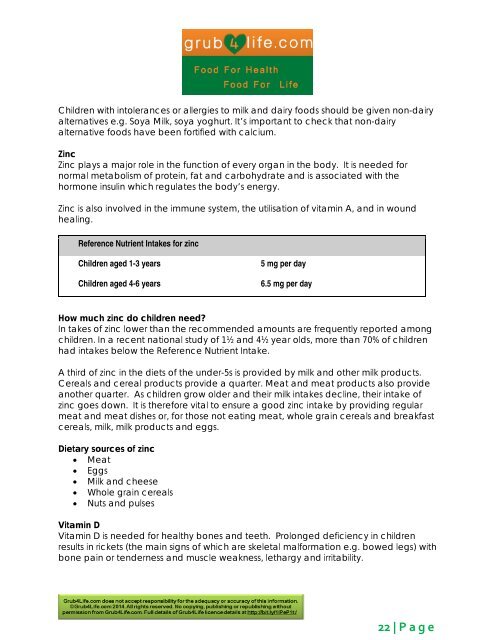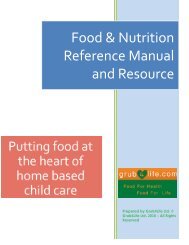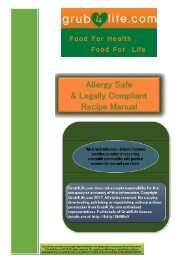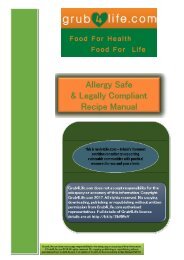Grub4Life Food and Nutrition Reference Manual
You also want an ePaper? Increase the reach of your titles
YUMPU automatically turns print PDFs into web optimized ePapers that Google loves.
Children with intolerances or allergies to milk <strong>and</strong> dairy foods should be given non-dairy<br />
alternatives e.g. Soya Milk, soya yoghurt. It’s important to check that non-dairy<br />
alternative foods have been fortified with calcium.<br />
Zinc<br />
Zinc plays a major role in the function of every organ in the body. It is needed for<br />
normal metabolism of protein, fat <strong>and</strong> carbohydrate <strong>and</strong> is associated with the<br />
hormone insulin which regulates the body’s energy.<br />
Zinc is also involved in the immune system, the utilisation of vitamin A, <strong>and</strong> in wound<br />
healing.<br />
<strong>Reference</strong> Nutrient Intakes for zinc<br />
Children aged 1-3 years<br />
Children aged 4-6 years<br />
5 mg per day<br />
6.5 mg per day<br />
How much zinc do children need?<br />
In takes of zinc lower than the recommended amounts are frequently reported among<br />
children. In a recent national study of 1½ <strong>and</strong> 4½ year olds, more than 70% of children<br />
had intakes below the <strong>Reference</strong> Nutrient Intake.<br />
A third of zinc in the diets of the under-5s is provided by milk <strong>and</strong> other milk products.<br />
Cereals <strong>and</strong> cereal products provide a quarter. Meat <strong>and</strong> meat products also provide<br />
another quarter. As children grow older <strong>and</strong> their milk intakes decline, their intake of<br />
zinc goes down. It is therefore vital to ensure a good zinc intake by providing regular<br />
meat <strong>and</strong> meat dishes or, for those not eating meat, whole grain cereals <strong>and</strong> breakfast<br />
cereals, milk, milk products <strong>and</strong> eggs.<br />
Dietary sources of zinc<br />
• Meat<br />
• Eggs<br />
• Milk <strong>and</strong> cheese<br />
• Whole grain cereals<br />
• Nuts <strong>and</strong> pulses<br />
Vitamin D<br />
Vitamin D is needed for healthy bones <strong>and</strong> teeth. Prolonged deficiency in children<br />
results in rickets (the main signs of which are skeletal malformation e.g. bowed legs) with<br />
bone pain or tenderness <strong>and</strong> muscle weakness, lethargy <strong>and</strong> irritability.<br />
22 | Page






